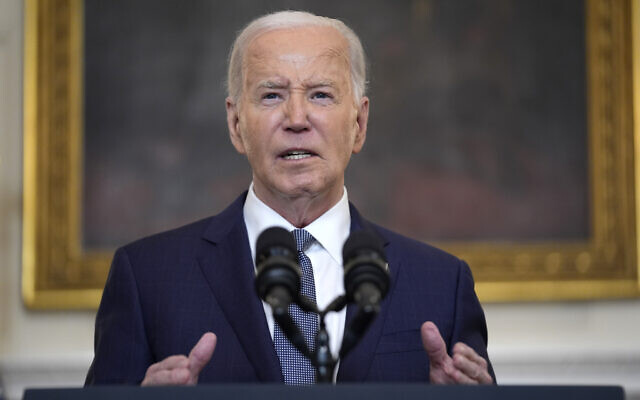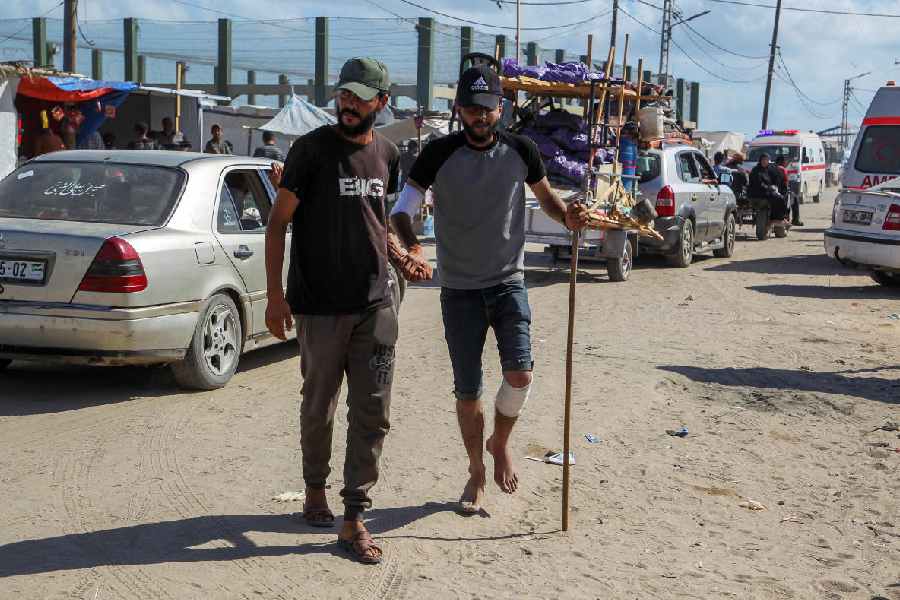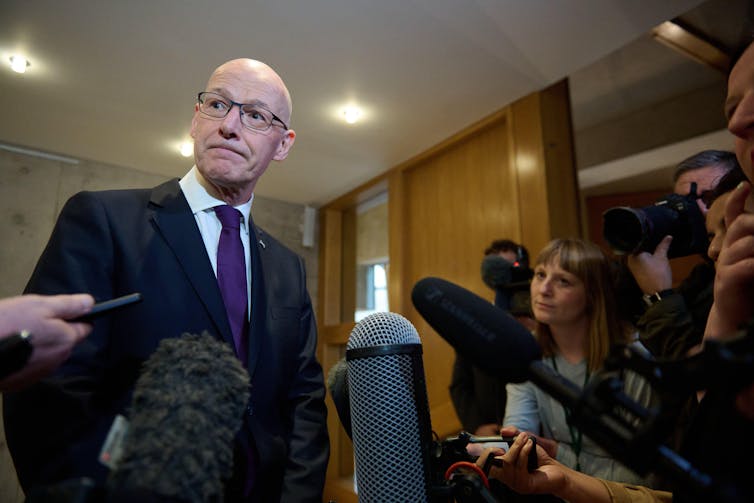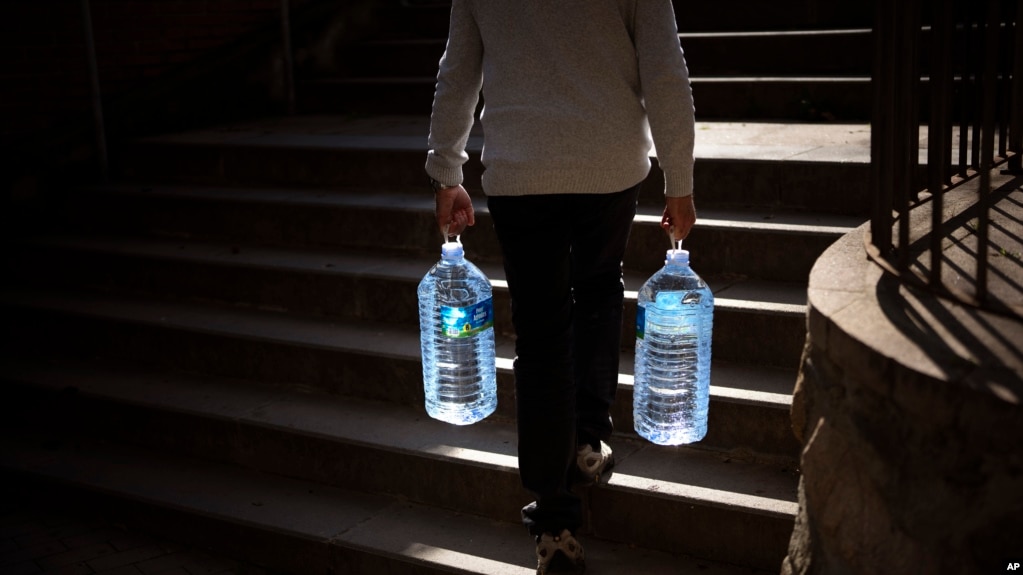'The proposal put forward by @POTUS is an opportunity to end the suffering and return to a path to peace,' says Canadian prime minister
Servet Gunerigok |01.06.2024 -

WASHINGTON
Canada voiced support Friday for a roadmap for a cease-fire and the release of hostages in the Gaza Strip announced by US President Joe Biden.
Prime Minister Justin Trudeau reiterated that Canada has been calling for an immediate cease-fire, an urgent increase in unhindered humanitarian assistance and the release of all hostages.
"The proposal put forward by @POTUS is an opportunity to end the suffering and return to a path to peace. All parties must seize it," the Canadian prime minister wrote X, referring to the President of The United States.
Canadian Foreign Minister Melanie Joly said the level of human suffering from the Israel-Hamas conf is catastrophic and it must come to an end.
"Canada has been calling for an immediate ceasefire for months - the violence must stop. Hostages must be released and Hamas must lay down its weapons," she also wrote on X. "Unimpeded humanitarian relief must be provided to Palestinian civilians. Canada fully supports the proposal outlined by @POTUS today. It must be accepted. All parties must seize this opportunity to bring an end to human suffering and build a path towards an irreversible two-state solution," wrote Joly.
Biden said earlier that Israel presented the Palestinian resistance group, Hamas, with a three-phase deal that would end hostilities in the besieged Gaza Strip and secure the release of hostages held in the coastal enclave.
The US president appealed to Hamas to accept the deal and urged Israeli Prime Minister Benjamin Netanyahu to stave off pressure from members of his governing coalition who are opposed to the plan.
More than 36,000 Palestinians have been killed in Gaza since Israel began its onslaught nearly eight months ago. The majority of those killed have been women and children, with more than 82,000 others injured, according to local health authorities.
The Hamas-led Oct. 7 attack killed less than 1,200 people.
Vast swathes of Gaza lay in ruins amid Israel's crippling blockade of food, clean water and medicine.
Israel is accused of genocide at the International Court of Justice (ICJ), which in its latest ruling has ordered Tel Aviv to immediately halt its operation in Rafah where more than 1 million Palestinians had sought refuge from the war.
'It is an extraordinary proposal which is potentially ground-shifting'
Issued on: 01/06/2024
President Joe Biden on Friday detailed a three-phase deal proposed by Israel to Hamas militants that he says would lead to the release of the remaining hostages in Gaza and could end the grinding, nearly 8-month-old Mideast war. "It is an extraordinary proposal which is potentially ground-shifting", said FRANCE24's Chief Foreign Editor Rob Parsons. "It lays out a roadmap not just to peace but to the reconstruction of the Gaza Strip as well."
Hamas on Friday said it "considers positively" an Israeli roadmap towards a full Gaza ceasefire announced by US President Joe Biden, who urged an end to the almost eight-month war.

Israel invaded the Gaza Strip in what Netanyahu has called an effort to destroy Hamas. (Photo: Reuters)
Reuters
New Delhi,
In ShortBiden describes three-phase Israeli proposal for ceasefire in Gaza
The proposal has won positive initial reaction from Hamas
Biden says "it's time for this war to end"
US President Joe Biden on Friday laid out what he described as a three-phase Israeli proposal for a ceasefire in Gaza in return for the release of Israeli hostages, saying "it's time for this war to end" and winning a positive initial reaction from Hamas.
The first phase involves a six-week ceasefire when Israeli forces would withdraw from "all populated areas" of Gaza, some hostages - including the elderly and women - would be freed in exchange for hundreds of Palestinian prisoners, Palestinian civilians could return to their homes in Gaza and 600 trucks a day would bring humanitarian aid into the devastated enclave.
In this phase, Hamas and Israel would negotiate a permanent ceasefire that Biden said would last "as long has Hamas lives up to its commitments." If negotiations took more than six weeks, the temporary ceasefire would extend while they continued.
In the second phase, Biden said there would be an exchange for all remaining living hostages, including male soldiers, Israeli forces would withdraw from Gaza and the permanent ceasefire would begin.
The third phase would include a major reconstruction plan for Gaza and the return of the "final remains" of hostages to their families.

"It's time for this war to end and for the day after to begin," said Biden, who is under election-year pressure to stop the Gaza conflict, now in its eighth month.
Hamas, which Biden said received the proposal from Qatar, released a statement reacting positively.
Hamas said it was ready to engage "positively and in a constructive manner" with any proposal based on a permanent ceasefire, withdrawal of Israeli forces, the reconstruction of Gaza, a return of those displaced, and a "genuine" prisoner swap deal if Israel "clearly announces commitment to such deal".
Israeli Prime Minister Benjamin Netanyahu's office said he had authorized his negotiating team to present the deal, "while insisting that the war will not end until all of its goals are achieved, including the return of all our hostages and the destruction of Hamas' military and governmental capabilities."
Separately, the Israeli military said its forces have ended operations in north Gaza's Jabalia area after days of intense fighting, while probing further into Rafah in south Gaza to target what they say is the last major Hamas redoubt.
The conflict began on Oct. 7 when gunmen led by the Islamist Palestinian group stormed into southern Israel on motorcycles, paragliders and four-wheel drive vehicles, killing 1200 people and abducting more than 250, according to Israeli tallies.
Israel then invaded the Gaza Strip in what Netanyahu has called an effort to destroy Hamas, the militant Palestinian group that seized control of the area from the Fatah Palestinian faction in a violent struggle in 2007.
Talks mediated by Egypt, Qatar and others to arrange a ceasefire between Israel and Hamas have repeatedly stalled, with each side blaming the other for the lack of progress.
AN INDEFINITE WAR
In his speech, Biden called on the Israeli leadership to resist pressure from those in Israel who were pushing for the war to go on "indefinitely," a group he said included some in the Israeli governing coalition.
"They want to occupy Gaza. They want to keep fighting for years and hostages are not a priority for them. Well, I've urged leadership in Israel to stand behind this deal, despite whatever pressure comes," he added.
He implored Israelis not to miss the chance for a ceasefire.
"As the only American president who has ever gone to Israel at a time of war, as someone who just sent the U.S. forces to directly defend Israel when it was attacked by Iran, I ask you to take a step back, think what will happen if this moment is lost," he said. "We can't lose this moment."
The Gaza war has put Biden in a political bind.
On the one hand, he has long been a staunch supporter of Israel and would like to ensure funding and support from the pro-Israel community in the United States in his Nov. 5 election rematch against Republican former President Donald Trump.
On the other, progressive elements of Biden's Democratic Party have grown increasingly angry at the president for the suffering the conflict has caused civilians in Gaza.
Palestinian health authorities estimate more than 36,280 people have been killed in Gaza since Israel attacked, and the United Nations says over a million people face "catastrophic" levels of hunger as famine takes hold in parts of the enclave.
Signaling a US effort to build support for the proposal, the State Department said US Secretary of State Antony Blinken spoke with his Jordanian, Saudi and Turkish counterparts.
Speaking to the Turkish foreign minister, "he emphasized that Hamas should accept the deal and that every country with a relationship with Hamas should press it to do so without delay,' the State Department said.
In a sign of support for Israel despite the partisan divide in the United States, leaders of the Democratic-led US Senate and of the Republican-led House of Representatives on Friday invited Netanyahu to address a joint meeting of Congress.
The week has been dominated by the fallout from an Israeli air strike in Rafah on Sunday that killed 45 Palestinians.
"The Palestinian people have endured sheer hell in this war," Biden said on Friday. "We all saw the terrible images from the deadly fire in Rafah earlier this week."
US President Joe Biden announces three-phase deal proposed by Israel to end war on Gaza
Biden called the latest proposal ‘a road map to an enduring ceasefire and the release of all hostages’.
United States President Joe Biden on Friday said Israel had proposed a three-phase ceasefire deal to the Palestinian militant group Hamas, reported the Associated Press.
Israel’s war on Gaza began after Hamas’ incursion into southern Israel on October 7 that killed 1,200 people. The militant group had also taken over 200 people hostage.
A hundred of those hostages are still believed to be alive and in Gaza, according to Al Jazeera. Some of the hostages were released in November as part of a brief ceasefire agreement and others were killed as a result of the war.
Since October, Israel has been carrying out unprecedented air and ground strikes on Gaza. The attacks have killed at least 36,700 persons, including over 15,000 children.
During a press conference at the White House on Friday, Biden said that Hamas was “no longer capable” of carrying out another large-scale attack on Israel. He also called the latest proposal “a road map to an enduring ceasefire and the release of all hostages”.
The US president said that the first phase of the proposal, lasting for six weeks, would entail a “full and complete ceasefire”. It would also include the withdrawal of Israeli forces from all the populated areas of Gaza.
Humanitarian assistance would also flow in during the first phase, with 600 trucks being allowed into the besieged enclave each day.
The first phase would also see the release of hostages – including women, the elderly and the wounded – in exchange for the release of hundreds of Palestinian prisoners. Biden said that American hostages would be released at this stage.
The second phase would entail the release of the remaining hostages, including male soldiers. It would also include the withdrawal of Israeli troops from Gaza.
Hamas and Israel would negotiate terms of a permanent end to hostilities during this phase, reported Reuters. "The ceasefire will still continue as long as negotiations continue,” said Biden.
According to the president, “as long as Hamas lives up to its commitments, the temporary ceasefire would become, in the words of the Israeli proposal, ‘the cessation of hostilities permanently’,” said Biden.
The president said that the third phase called for the beginning of the reconstruction of Gaza.
After Biden’s speech, Israeli Prime Minister Benjamin Netanyah’s office said that he had authorised the country’s team negotiating for its hostages to find a way to release those remaining in Gaza, AP reported.
The prime minister’s office added that the “exact outline” proposed by Israel had to be followed.
However, it said that “the war will not end until all of its goals are achieved, including the return of all our abductees and the elimination of Hamas’ military and governmental capabilities”.
On the other hand, Hamas welcomed Biden’s statement and his call for “a permanent ceasefire, withdrawal of [Israeli] occupation forces from the Gaza Strip, reconstruction and prisoners exchange”, Al Jazeera reported.
The Palestinian militant group said that it was willing to respond “positively and constructively” to a proposal that included these measures as long as Israel also “explicitly” committed to it.
The development comes days after Israel conducted air strikes on a camp housing displaced Palestinian civilians in Rafah city killing at least 45.
Rafah was considered the last refuge for Palestinians in Gaza after Israel launched ground operation starting from the northern areas of the territory. The southern city was also the main point of entry for fuel before the Israeli military captured the Gaza side of the Rafah crossing with Egypt.
Despite global outrage over the attack, Israel continued its operation in Gaza ignoring calls to halt the offensive in the city in the besieged Palestinian territory
On Thursday, India said that the loss of lives in the Israeli air strikes on displaced Palestinians in southern Gaza was “heartbreaking” and a “matter of deep concern”.
Ministry of External Affairs spokesperson Randhir Jaiswal said that India had always supported a two-state solution, which included the establishment of a “sovereign, viable, and independent state of Palestine within recognised and mutually agreed borders, living side by side with Israel in peace”.
Hamas expresses readiness to deal "positively" with Biden's proposal
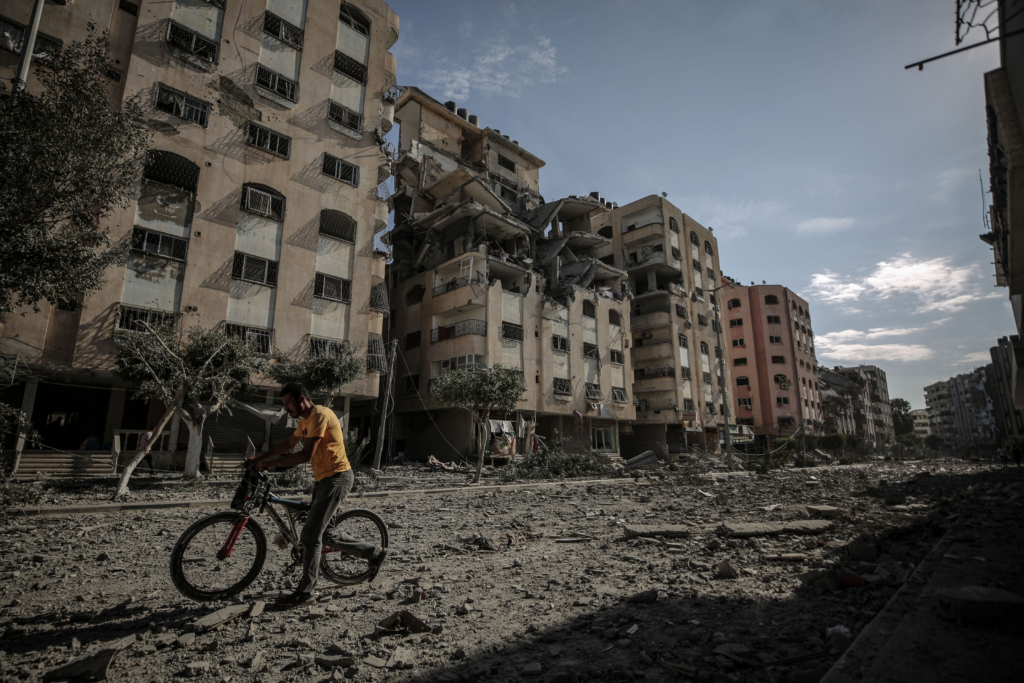
2024-05-31
Shafaq News/ On Saturday, Hamas commented on U.S. President Joe Biden's proposal regarding a ceasefire in Gaza.
In a statement, Hamas said, "We positively view what was included in the U.S. President's speech. We are ready to respond positively to any proposal that includes a permanent ceasefire, the complete Israeli withdrawal from Gaza, reconstruction, the return of displaced persons, and the exchange of prisoners and hostages."
Earlier on Friday, Biden unveiled an Israeli roadmap for a ceasefire in Gaza and the release of hostages, asserting that the plan would facilitate Tel Aviv's integration into the region and pave the way for a historic normalization agreement with Saudi Arabia.
"It is time to start a new phase where the hostages return to their homes, this war ends, and the next day begins," Biden said.
The U.S. President detailed the three-phase Israeli proposal to end the conflict: the first phase includes the return of Palestinians in Gaza to their homes; the second involves the exchange of all live prisoners, including Israeli soldiers; and the third focuses on the reconstruction of the Gaza Strip.
Furthermore, Biden noted that the proposal includes a six-week cessation of hostilities in the first phase, expressing his concern about the potential for increased global isolation of Israel if the plan is not executed.
"Israel wants to ensure that Hamas cannot carry out another attack similar to that of October 7th. Therefore, I urge the Israeli leadership to stand behind the new deal proposal despite any pressures," Biden emphasized.
U.S. President confirmed that the proposal has been conveyed to Qatar and Hamas, underscoring the importance of focusing on a truce and ending the war in Gaza.
Addressing Israel directly, Biden said, "As someone who has had a long-standing commitment to Israel, as the only American president who visited Israel during a time of war, and as someone who sent American forces to defend Israel when Iran attacked it directly, I ask you to pause and consider what will happen if this opportunity is lost... We cannot waste this opportunity. It is time to end the Gaza war."
Hours after the proposal, the Israeli Prime Minister's Office issued a statement asserting Netanyahu's determination "not to end the war until all its objectives are achieved."
"The Israeli government is united in its desire to return the captives as quickly as possible and is working to achieve this goal," the statement added.
Netanyahu has tasked the negotiating team with outlining the steps to achieve the goal of returning the captives held in the Gaza Strip, according to the statement.
Israel PM insists Gaza war will not end until ‘elimination’ of Hamas
Israeli Prime Minister Benjamin Netanyahu said Friday the Gaza war would not end until the “elimination” of Hamas’s capacity to govern and make war, after US President Joe Biden said Israel had offered a new peace roadmap.
“The prime minister authorised the negotiating team to present an outline for achieving (the return of hostages), while insisting that the war will not end until all of its goals are achieved, including the return of all our hostages and the elimination of Hamas’ military and governmental capabilities,” Netanyahu’s office said in a statement.
“The exact outline proposed by Israel, including the conditional transition from stage to stage, allows Israel to maintain these principles,” it added.
In his first major address outlining a solution to the eight-month conflict, Biden said the proposal started with a six-week phase that would see Israeli forces withdraw from all populated areas of Gaza.
“It’s time for this war to end, for the day after to begin,” Biden said in a televised address from the White House, adding that “we can’t lose this moment” to seize the chance for peace.
The Gaza war was sparked by Hamas’s October 7 attack on southern Israel, which resulted in the deaths of 1,189 people, mostly civilians, according to an AFP tally based on Israeli official figures.
Militants also took 252 hostages, 121 of whom remain in Gaza, including 37 the army says are dead.
Israel’s retaliatory offensive has killed at least 36,284 people in Gaza, mostly civilians, according to the Hamas-run territory’s health ministry.
BIDEN: HAMAS NO LONGER CAPABLE OF CARRYING OUT ANOTHER OCT. 7
‘Time for this war to end’: Biden tells Hamas to accept Israel’s hostage-ceasefire offer
President sets out Israel’s proposal, urges gov’t to stand behind it; says Gaza ops can resume if terror group breaks deal; PMO: War won’t end until all goals met; Hamas ‘positive’
Declaring that it is “time for this war to end,” US President Joe Biden gave a high-stakes speech Friday, presenting what he said was the latest Israeli proposal for a hostage deal and ceasefire to end the Israel-Hamas war, and calling on the terror group to accept the offer.
The Israeli proposal was submitted on Thursday to Hamas via Qatar, Biden revealed, saying the offer would “bring all the hostages home, ensure Israel’s security, create a better day after in Gaza without Hamas in power, and set the stage for a political settlement that provides a better future for Israelis and Palestinians alike.”
Biden laid out the details of three phases, with particular emphasis on the first six-week phase, which was largely similar to the framework that was discussed in previous rounds of negotiations but included new conditions detailed by the president for the first time.
Several times during the speech in the State Dining Room of the White House, Biden put the ball in Hamas’s court, urging it to accept the type of ceasefire that its leaders and supporters have repeatedly called for.
While he described the latest proposal as one crafted by Israel, and thus presumably approved by the narrow war cabinet, he evidently recognized that this was not the final say from Jerusalem and urged Prime Minister Benjamin Netanyahu’s full government to stand behind the offer its negotiators submitted indirectly to Hamas.
Biden said the deal also carried with it the opportunity for subsequent gains for both Israelis and Palestinians. For Israel, it would allow for a return to calm on the Lebanon border and a normalization agreement with Saudi Arabia. For the Palestinians, it would enable them to advance toward self-determination.
Netanyahu’s office issued a statement immediately after Biden’s speech, but it avoided responding directly to the president’s message.
Instead, it said that the latest Israeli proposal fulfills both of Israel’s war aims of returning all remaining 125 hostages and eliminating Hamas’s military and governmental capabilities. It did not specify that the proposal it was referencing was the one Biden detailed.
For its part, Hamas issued a statement welcoming Biden’s speech and said it would negotiate in good faith to secure a permanent ceasefire and the permanent withdrawal of Israeli forces from Gaza.
A senior US official speaking on condition of anonymity told The Times of Israel that “both Israel and Hamas will try and frame the proposal in a manner that suits them, so it’s best to listen to the way it was laid out by the president.”
Phase one
The first phase of the deal would include a complete ceasefire; the withdrawal of Israeli forces from all populated areas of Gaza; the release of a number of female, elderly and sick hostages by Hamas; and the release of hundreds of Palestinian security prisoners by Israel, Biden said, noting that American hostages would be among those released in this first stage.
Additionally, a number of bodies of deceased hostages would also be released, Biden said, revealing for the first time that Israel had moved from its previous demand not to accept any bodies during this “humanitarian” phase of the hostage deal.
During negotiations in recent weeks, Israel demanded the release of 33 female, elderly and wounded hostages who are still alive in Gaza. Hamas claimed that it did not have that many living hostages in those categories. Israel demanded that Hamas release living hostages from other categories if that were the case. But the terror group refused, saying it would only be willing to release additional bodies to make up for the discrepancy.
Further detailing the first phase, Biden said that Palestinians would be allowed to return to their homes and neighborhoods throughout Gaza, including in the north. Israel in earlier rounds of negotiations had pushed back on the unrestricted return of Palestinians, particularly to the north, fearing it would lead to Hamas regrouping. In the last round of indirect contacts, though, Israel reportedly let go of this demand as well.
Biden said 60 trucks of humanitarian aid would be surged into Gaza each day of the first phase. Hundreds of thousands of temporary shelters, including housing units, would also be delivered by the international community.
During the six-week phase, Israel and Hamas would “negotiate the necessary arrangements to get to phase two, which is a permanent end to hostilities,” Biden said.
Critically, he revealed a new detail of the first phase, which is that if those likely complex negotiations regarding the terms of the next phase took longer than six weeks, the ceasefire would be extended.
“The United States, Egypt, and Qatar [will] work to ensure negotiations keep going… until all the agreements are reached and phase two is able to begin,” Biden said.

This provision appeared to mark an attempt by the mediators to coax Hamas to agree to the first phase of the proposal. The terror group has been adamant that it will only agree to a permanent ceasefire, while Israel insists that it will only agree to a temporary one in exchange for the release of the first batch of hostages.
This new clause would appear to enable the indefinite extension of the six-week phase, so long as Hamas is seen as negotiating in good faith.
“If Hamas fails to uphold its commitments under the deal, Israel can resume military operations. But Egypt and Qatar have assured me they are continuing to work to ensure that Hamas doesn’t do that,” Biden said. “The United States will help ensure that Israel lives up to their obligations as well.”
Biden did not detail the rate at which the Israeli hostages would be released during the first phase. Hamas in previous negotiations has sought to spread out the release of the Israeli hostages as much as possible.
However, the framework laid out by Biden would seem to encourage Hamas to complete the negotiations in the course of phase one regarding the continuation of the deal, as the complete proposal would ostensibly enable the terror group’s survival in some form.
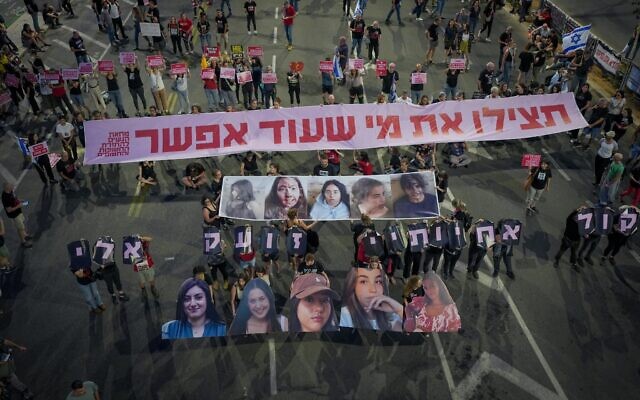
Briefing reporters on condition of anonymity shortly after Biden’s speech, a senior US official acknowledged that the negotiations during phase one would be very difficult and require the sides to agree on a ratio for how many Palestinian security prisoners would be released in exchange for the remaining male Israeli hostages in phase two.
“It’s fair to say that if [we get to] phase two and phase three, Israel will have some guarantees about its own security [so] that Gaza can no longer be a platform for terrorism and threats against Israel,” the senior administration official clarified.
Phases two and three
In phase two, Hamas would release the remaining living Israeli hostages, including male soldiers. Israel, in exchange, would withdraw its forces entirely from Gaza and release the agreed-upon number of Palestinian security prisoners.
“As long as Hamas lives up to its commitments, a temporary ceasefire would become… permanent,” Biden said.
Netanyahu’s office has denied several times to date that the proposals Israel agreed to in the past included a willingness to implement a permanent ceasefire. But Biden specified this as an element of the second stage of what he stressed was the Israeli proposal.
“Finally, in phase three, a major reconstruction plan for Gaza would commence. And any final remains of hostages who have been killed would be returned to their families,” the president said.

Elaborating on phase three, the senior administration official said it would include “a pretty extensive three-to-five year reconstruction program for Gaza… fully backed by the US, the international community and others.”
The senior official said phases two and three would also last six weeks, adding that the Israeli proposal on the table is highly detailed and four-and-a-half pages long.
Direct appeal to Israelis
Biden took time in his speech to try and sell the deal directly to Israel’s leaders and the public, asserting that sticking with the proposal would not put the country’s security at risk.
Israel has “devastated Hamas’s [forces] over the past eight months. At this point, Hamas is no longer capable of carrying out another October 7,” Biden said, making this assertion for the first time. “This was one of Israel’s main objectives in this war — and quite frankly, a righteous one.”
“I don’t think this offer would have been possible three months ago,” the senior administration official briefing reporters added.
Biden in his speech addressed the likely pushback that the proposal would face, apparently differentiating between the war cabinet that authorized the Mossad-Shin Bet-IDF negotiating team to craft the latest offer and the broader Israeli security cabinet, which includes far-right members to whom Netanyahu is beholden for his political survival.

“I know there are those in Israel who will not agree with this plan and will call for the war to continue indefinitely. Some are even in the governing coalition. They’ve made it clear that they want to occupy Gaza, they want to keep fighting for years, and the hostages are not a priority to them,” Biden said in a blistering critique. He avoided naming Netanyahu and his far-right partners Bezalel Smotrich and Itamar Ben Gvir in the speech.
“I’ve urged the leadership in Israel to stand behind this deal, despite whatever pressure comes,” Biden said, clearly referring to Netanyahu.
“If Hamas comes to negotiate ready to deal, then Israel’s negotiators must be given a mandate with the necessary flexibility to close that deal,” he said, referring to the Netanyahu-led war cabinet, which is tasked with providing the negotiating team with parameters for the talks.
Turning to the Israeli people, Biden stressed that he was presenting this offer “as someone who has had a lifelong commitment to Israel, as the only American president who has ever gone to Israel at a time of war, as someone who just sent US forces to directly defend Israel when it was attacked by Iran.”
“I ask you to take a step back and think what will happen if this moment is lost.”
“Indefinite war in pursuit of an unidentified notion of ‘total victory’ will only bog down Israel in Gaza, draining military, economic and human resources and further Israel’s isolation in the world,” the president said in a more direct attack on Netanyahu, who has repeatedly vowed to achieve “total victory” in Gaza.
“That will not bring hostages home. That will not bring an enduring defeat of Hamas. That will not bring Israel lasting security,” Biden asserted.
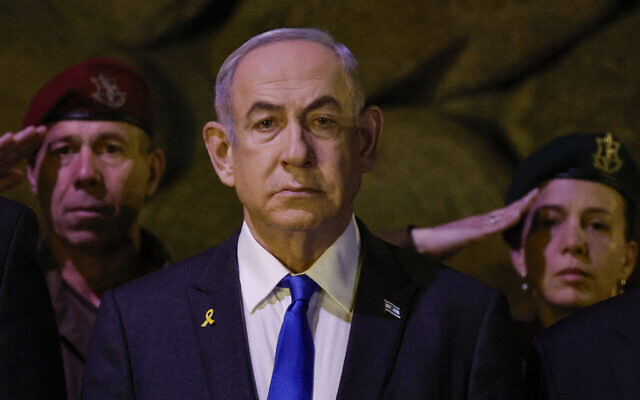
A ceasefire is just the beginning
Biden went on to explain that the hostage deal on the table is part of a comprehensive approach that will ensure Israel’s long-term security.
“Once a ceasefire and hostage deal is concluded, it unlocks the possibility of a great deal of more progress, including calm along Israel’s northern border with Lebanon. The United States will help forge a diplomatic resolution… that ensures Israel’s security and allows people to safely return to their homes without fear of being attacked.”
“With the deal, the rebuilding of Gaza will begin. Arab nations and the international community along with Palestinian and Israeli leaders [will work together] to get it done in a manner that does not allow Hamas to rearm,” Biden said.
“The United States will work with our partners to rebuild homes, schools and hospitals in Gaza, to help repair communities that were destroyed in the chaos of war.”
“With this deal, Israel could become more deeply integrated in the region,” Biden went on, highlighting the normalization deal he is working to broker between Israel and Saudi Arabia. “Israel could be part of a regional security network to counter the threat posed by Iran.”
“All this progress would make Israel more secure, with Israeli families no longer living in the shadow of a terrorist attack. All of this would create the conditions for a different future, a better future for the Palestinian people, one of self-determination, dignity, security and freedom.”

“We have to work to reform the PA in the West Bank, which is ongoing and to having an interim administration in Gaza that can help with stabilization and pathway forward there,” the senior official elaborated soon after the speech.
Biden notably made no mention of a “two-state solution” or a “pathway to a future Palestinian state,” which have been regular talking points when the administration has laid out its post-war vision. Saudi officials had previously asserted that they would not normalize ties with Israel unless Jerusalem commits to an irreversible path to Palestinian statehood.
The absence of such rhetoric was un-ignorable, as was the proximity of Biden’s speech to an announcement from House Speaker Mike Johnson, minutes later, that Congress had submitted a formal invitation for Netanyahu to discuss the Israel-Hamas war in an address to a joint session of Congress.
The invitation had been held up for weeks by Senate Majority Leader Chuck Schumer, a close ally of Biden’s who gave a speech in March calling for early elections in Israel to replace Netanyahu. A congressional aide told The Times of Israel that Schumer’s office coordinated with the White House on the matter.
Biden clarified that even after the war, “Israel will always have the right to defend itself against threats to its security and to bring those responsible for October 7 to justice.”
The line was an indication that the US would give Israel cover to continue pursuing Hamas’s leaders after the war.
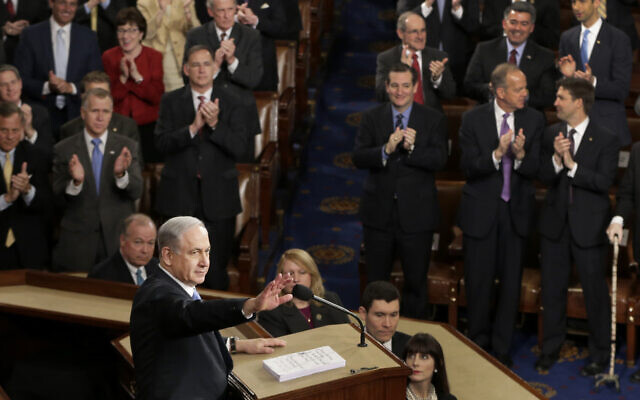
This appeared to be part of a broader post-war approach to Hamas by the US, which seems reconciled to the terror group managing to limp on in some form. However, US officials asserted to The Times of Israel earlier this month that the broader diplomatic initiative Washington is advancing would see the terror group marginalized in Gaza and no longer able to pose a threat to Israel.
“The United States will always ensure that Israel has what it needs to defend itself,” Biden added, in his latest attempt to assure Israelis that he wasn’t abandoning them, weeks after he withheld a shipment of high-payload bombs and threatened to block more if Israel launched a major offensive in the populated areas of Gaza’s southernmost city of Rafah.
‘Hamas needs to take the deal’
“The past eight months have been marked by heartbreaking pain of those whose loved ones were slaughtered by Hamas terrorists on October 7; hostages and their families waiting in anguish; ordinary Israelis whose lives are forever marked by the shattering event of Hamas’s sexual violence and ruthless brutality,” Biden said.
“The Palestinian people have endured sheer hell in this war,” he added. “Too many people have been killed, including thousands of children. Far too many have been badly wounded. We all saw the terrible images from a deadly fire in Rafah earlier this week following an Israeli strike targeting Hamas.”
“This is truly a decisive moment. Israel has made their proposal. Hamas says it wants a ceasefire. This deal is an opportunity to prove whether they really mean it,” Biden said. “Hamas needs to take the deal.”
The senior US official briefing reporters argued that the latest Israeli proposal was almost identical to the demands previously laid out by Hamas.
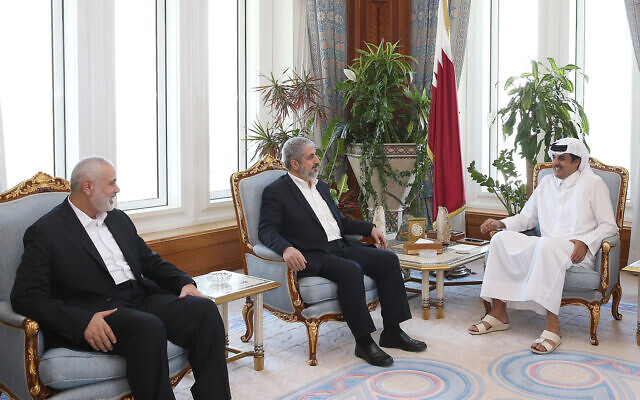
“This is now at the stage where Hamas has said they’d be prepared to do deal X, and what is now on the table is basically that, with some very minor adjustments,” the official said.
Asked about Hamas’s statement Thursday that it would not be willing to negotiate further with Israel unless the IDF halts all fighting in Gaza, the senior administration official downplayed the threat, suggesting there is a difference between what the terror group says publicly and what it says privately.
The official noted that Hamas only received the Israeli proposal on Thursday night and would likely need time to make a decision.
“But [Biden] felt very strongly… that it was time to lay out very clearly what is offered in this proposal, and particularly in those first six weeks,” the senior official said.
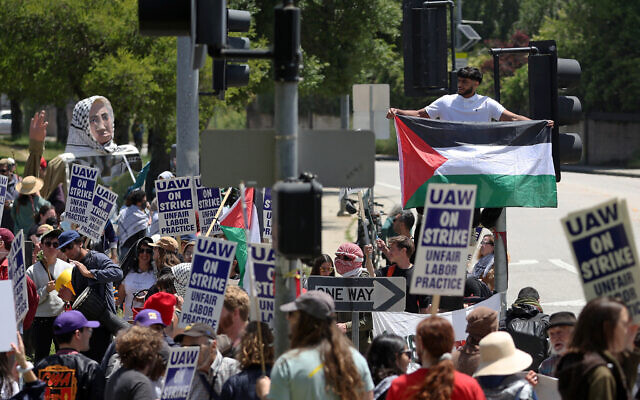
Before wrapping up his speech, Biden turned to the pro-Palestinian and anti-Israel protesters around the world who have flooded the streets for months demanding a ceasefire. Those calls have largely been directed at Israel, with little mention of Hamas at all.
Biden urged a correction. “Now it’s time to raise your voices and demand that Hamas come to the table, agree to this deal, and end this war that they began.”
Indicating that pressure also needed to be put on Israel, however, Biden added, “Let the leaders know they should take this deal.”
“It’s time for this war to end, and for the day after to begin,” he concluded.

Israel ambiguous, Hamas positive
In a statement issued immediately after Biden’s speech, Netanyahu’s office said, “The Israeli government is united in the desire to return our hostages as soon as possible and is working to achieve this goal.”
“Therefore, the prime minister authorized the negotiating team to present an outline for achieving this goal, while insisting that the war will not end until all of its goals are achieved, including the return of all our hostages and the elimination of Hamas’ military and governmental capabilities,” the statement continued.
“The exact outline proposed by Israel, including the conditional transition from stage to stage, allows Israel to maintain these principles,” the statement added.
Netanyahu’s office did not clarify whether its proposal is the same one described by Biden during his speech — and did not refer directly to Biden’s speech at all.
Asked whether the deal described by Netanyahu’s office is the same one Biden laid out in his speech, a senior administration official briefing reporters avoided answering directly.
“I have no doubt that the deal will be characterized by Israel and will be characterized by Hamas, but we know what’s in the deal. We know what the expectations are,” the official said.

“Often these deals are characterized by those who might not want to see the deal,” the official had said earlier in the briefing.
In its statement, Hamas said it “positively views” the proposal presented by Biden, specifying “his call to a permanent ceasefire, the Israeli forces’ withdrawal from the Gaza Strip, the reconstruction of Gaza and the exchange of prisoners.”
“The movement affirms its readiness to deal positively and constructively with any proposal based on [these components],” Hamas said.
The terror group added that it regards the development in negotiations and the US commitment to ending the war in Gaza sparked by its October 7 massacre “to be the result of the legendary steadfastness of our struggling people and their brave resistance.”

